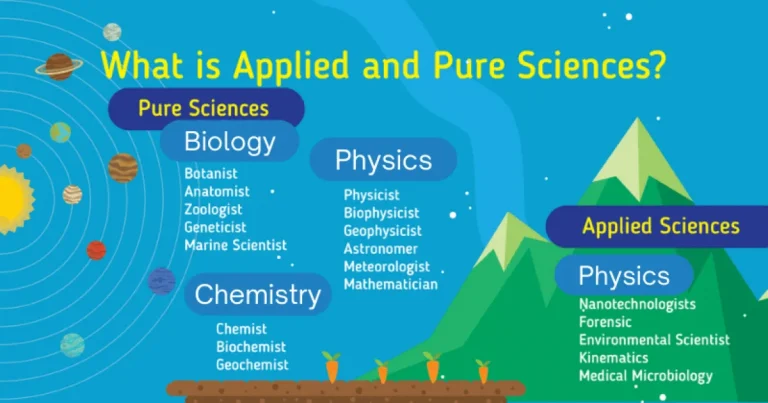Examining The Challenging Nature Of Scientific Pursuits
Science has produced awe-inspiring advancements that have transformed human civilization. Yet the process of making new discoveries involves tackling extremely difficult intellectual challenges. In this comprehensive article, we’ll take a deep dive into the complex, demanding nature of science and why mastering it requires such rigorous effort.
If you’re short on time, here’s the gist: Science is so hard because it deals with complex systems we struggle to fully grasp, uses advanced mathematical concepts, requires specialized knowledge and skills, and follows a meticulous, detail-oriented methodology.
Inherent Complexity of Natural Systems
The study of natural systems is an intriguing but challenging endeavor due to their inherent complexity. Natural systems are characterized by interconnected, dynamic relationships, which often make them difficult to fully understand and predict.
These relationships can span across various levels, from individual organisms to entire ecosystems, and involve a multitude of interacting factors.
Interconnected, dynamic relationships
One of the key aspects of natural systems is the interconnectedness of their components. Organisms within an ecosystem are intricately linked through various ecological interactions, such as predation, competition, and symbiosis.
Changes in one part of the system can have cascading effects on other parts, leading to complex feedback loops and nonlinear responses.
For example, consider a predator-prey relationship between wolves and deer. If the wolf population decreases, the deer population may increase, which can then put pressure on the availability of food resources, leading to further ecological changes.
Understanding and predicting these interconnected relationships requires comprehensive studies and data analysis.
Emergent properties difficult to predict
Natural systems often exhibit emergent properties, which are characteristics that arise from the interactions of individual components but cannot be directly attributed to any single component alone. These emergent properties can be difficult to predict or explain solely based on the knowledge of individual parts.
For instance, the behavior of a flock of birds or a school of fish emerges from the interactions between individual organisms, resulting in complex collective patterns. Despite having a deep understanding of the behavior and physiology of individual birds or fish, predicting the precise movement of the entire group can be challenging due to the emergent nature of their behavior.
High degree of variables and uncertainty
Natural systems encompass a high degree of variables and inherent uncertainty. Numerous factors, such as environmental conditions, genetic variations, and stochastic events, contribute to the complexity and unpredictability of these systems.
Trying to account for every possible variable and their interactions can be an overwhelming task.
Climate change provides a clear example of the high degree of variables and uncertainty in natural systems. The Earth’s climate is influenced by a multitude of factors, including greenhouse gas emissions, solar radiation, ocean currents, and atmospheric circulation patterns.
Understanding and predicting the long-term impacts of climate change requires sophisticated models that take into account these complex interactions and uncertainties.
Sophisticated Mathematical Foundations
When it comes to scientific pursuits, a solid understanding of mathematics is crucial. Sophisticated mathematical foundations provide scientists with the tools they need to quantify, analyze, and model complex phenomena.
From quantitative measurement and analysis to abstract models and equations, and even challenging calculations and statistics, mathematics serves as the bedrock of scientific exploration.
Quantitative Measurement and Analysis
Quantitative measurement and analysis are essential in the scientific world. By using precise numerical data, scientists can gather objective information and draw meaningful conclusions. Whether it’s measuring the temperature of an environment, the concentration of a substance, or the velocity of an object, quantitative measurement allows for accurate observations.
Statistical analysis then helps scientists make sense of the data by identifying patterns, trends, and relationships.
Abstract Models and Equations
Scientific pursuits often involve working with abstract models and equations. These mathematical representations allow scientists to simplify complex systems and understand their underlying principles.
For example, in physics, mathematical equations such as Newton’s laws of motion or Einstein’s theory of relativity provide a framework for understanding how objects move and interact in the universe. Similarly, in biology, mathematical models can help predict the spread of diseases or the growth of populations.
Challenging Calculations and Statistics
The nature of scientific pursuits often involves challenging calculations and statistics. Scientists may need to solve intricate equations, perform complex integrations, or analyze large datasets. These calculations and statistical analyses require a deep understanding of mathematical concepts and techniques.
They can be time-consuming and mentally demanding, but they are essential for drawing accurate conclusions and making informed decisions.
Scientific pursuits would not be possible without sophisticated mathematical foundations. These foundations enable scientists to quantitatively measure and analyze phenomena, work with abstract models and equations, and tackle challenging calculations and statistics.
By harnessing the power of mathematics, scientists continue to push the boundaries of knowledge and make groundbreaking discoveries.
Specialized Knowledge and Skills Needed
Scientific pursuits require individuals to possess specialized knowledge and skills in various areas. These skills are essential for conducting research, analyzing data, and making meaningful contributions to the scientific community.
Here are some key areas where specialized knowledge and skills are crucial:
Subject mastery through education
In order to excel in scientific pursuits, individuals must have a deep understanding of their chosen field. This requires acquiring subject mastery through education, such as earning a degree in a specific scientific discipline.
A solid educational foundation provides scientists with the necessary knowledge to conduct research, critically analyze information, and contribute to advancements in their field.
Lab equipment operation
Operating laboratory equipment is another critical skill that scientists must possess. From microscopes to complex machinery, scientists need to be proficient in using various tools and instruments to conduct experiments and collect accurate data.
Proper training and hands-on experience are essential to ensure the safe and effective operation of lab equipment.
Data analysis proficiency
One of the most challenging aspects of scientific pursuits is the analysis of data. Scientists must be proficient in statistical analysis and data interpretation to draw meaningful conclusions from their experiments.
This requires a strong understanding of statistical methods, as well as the ability to use specialized software and tools for data analysis. Having these skills allows scientists to make accurate assessments and contribute to scientific knowledge.
It is important to note that acquiring specialized knowledge and skills is an ongoing process in the scientific community. Scientists constantly update their knowledge through continuous learning, attending conferences, and collaborating with colleagues.
The pursuit of scientific knowledge never ends, as new discoveries and advancements are made every day.
For more information on specialized knowledge and skills needed in scientific pursuits, you can visit websites like Nature or Science that provide valuable insights into the world of scientific research.
Meticulous Scientific Methodology
One of the key aspects of scientific pursuits is the meticulous methodology employed by researchers and scientists. The scientific method is a systematic approach that ensures the accuracy and reliability of scientific investigations.
It involves a series of steps that are followed diligently to gather evidence, test hypotheses, and draw conclusions. This methodology plays a vital role in advancing scientific knowledge and understanding.
Precision in designing experiments
When conducting scientific experiments, precision in design is of utmost importance. Researchers carefully plan and structure their experiments to ensure that they are able to obtain accurate and meaningful results.
This involves considering various factors such as the sample size, the selection of appropriate controls, and the use of reliable measurement techniques. By paying meticulous attention to these details, scientists are able to minimize errors and increase the validity of their findings.
Attention to controlling variables
Controlling variables is another crucial aspect of scientific methodology. Researchers strive to isolate and manipulate only the variables that are relevant to their study, while keeping all other factors constant.
This allows them to determine the exact influence of the variables under investigation. By controlling variables, scientists can confidently attribute any observed changes or effects to the specific factors they are studying, enhancing the reliability and accuracy of their results.
Rigor in collecting and recording observations
The collection and recording of observations is a fundamental step in scientific research. Scientists are meticulous in their approach, ensuring that data is collected in a consistent and systematic manner.
They use specialized tools and techniques to measure and record observations, taking care to minimize any biases or errors. This rigorous approach enables scientists to analyze and interpret their data accurately, leading to reliable conclusions and advancements in scientific knowledge.
Limits of Human Perception and Cognition
Observing tiny and immense scales
When it comes to scientific pursuits, one of the biggest challenges is the limits of human perception. Our senses are not equipped to directly perceive objects or phenomena that exist on either extreme end of the scale – the tiny and the immense.
At the microscopic level, scientists have to rely on powerful microscopes to observe and understand the behavior of atoms and molecules. On the other hand, when studying astronomical phenomena, such as distant galaxies or black holes, scientists rely on advanced telescopes and other instruments to gather data and make sense of the vastness of the universe.
Grasping abstract phenomena
Another challenge in scientific pursuits is the need to comprehend and explain abstract phenomena. Many scientific concepts, such as quantum mechanics or string theory, are highly abstract and go against our everyday intuitions.
Understanding and visualizing these concepts can be a daunting task even for the most brilliant minds. Scientists often resort to mathematical models and simulations to represent these abstract phenomena and make predictions about their behavior.
However, these models can sometimes be difficult to grasp for those without a strong background in mathematics and physics.
Overcoming cognitive biases
Human cognition is prone to biases and preconceived notions, which can hinder scientific progress. Confirmation bias, for example, leads us to seek out information that confirms our existing beliefs, while ignoring or dismissing evidence that contradicts them.
This can prevent scientists from considering alternative explanations or exploring new ideas. Overcoming cognitive biases requires a conscious effort to approach scientific pursuits with an open mind and a willingness to challenge our own assumptions.
Critical thinking and rigorous experimentation are essential in order to overcome these biases and advance our understanding of the world.
While these challenges can make scientific pursuits challenging, they also highlight the incredible potential of human perseverance and innovation. Despite our limitations, scientists have made remarkable discoveries and advancements throughout history, pushing the boundaries of our understanding and unlocking the mysteries of the universe.
Conclusion
In summary, science is an immensely challenging endeavor due to the inherent complexity of the natural world, advanced technical demands, rigorous procedures, and limits of human abilities. Pushing past these difficulties to uncover new knowledge requires brilliant, persistent effort from dedicated experts across all scientific domains.







